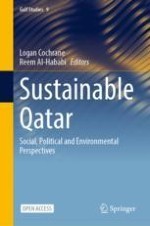New OPEN ACCESS book
Sustainable Qatar: Social, Political and Environmental PerspectivesCochrane, L. and Cafer, A. (2018) Does Diversification Enhance Community Resilience? A Critical Perspective. Resilience. https://doi.org/10.1080/21693293.2017.1406849
Abstract: Resilience has become a key component of how practitioners and scholars conceptualize sustainable communities. Given sustainability's focal role in shaping international development funding, policies and programming it is imperative that we critically engage with the concepts embedded within the resilience discourse – including prescriptions for increased diversity. This article contributes to a discourse that questions this common recommendation for diversification, particularly as it relates to agricultural livelihoods and smallholder production. We provide examples from Ethiopia that demonstrate the two limitations of diversification. The first, that some forms of diversification are, in fact, maladaptive and reduce resilience. The second, that diversification is not always equal – some forms of diversification are only accessible to the most vulnerable. As the 2030 Agenda moves ahead in shaping what is considered important, and therefore funded and measured, we argue that much more context-specific nuance is required within the resilience discourse.
From journal here. On this site in full here.
Location: Dalhousie University, Halifax, Nova Scotia
Start Date: September 2017
Salary: $12,000/year stipend (with possibility of further scholarship opportunities)
THE PROJECT
Sustainable Development cannot be achieved through one sector alone, yet education in particular is seen as a vehicle to move us towards this goal. While there is a plethora of literature that examines the role of formal education for sustainable development (ESD), to date there has been very little research that examines the potential role for non-formal and informal education. The Arts (i.e. visual arts, performance arts, and literature) may be one form of informal ESD that can have a significant influence on the development of cultural norms and therefore play a critical role in creating the cultural changes needed to achieve a sustainable future. However, preliminary investigations to date have found that there are very few scholarly works associated with the topic. This dearth of found materials may be a result of poor bibliographic indexing by scholarly databases, because the materials are located outside of conventional scholarly mediums (e.g. websites, playbills, exhibition catalogues, and other grey literature), or simply because there are few written materials on this subject. The purpose of this research is to identify scholars, artists and practitioners working in the area where the Arts, ESD and sustainability intersect in order to document their conceptualizations of the role the Arts could/should play in achieving a sustainable future; to thoroughly examining the extent to which both the scholarly and grey literature addresses sustainability and the Arts. Further, it has been recognized that scholars, social innovators and artists are often isolated from each other, because of limited opportunities for knowledge exchange and dialogue, and a lack of common methods for knowledge mobilization and translation. As such, this research aims to develop and encourage collaborative partnerships and intellectual exchange among artists and scholars engaged in the intersection of the Arts, ESD, and sustainability.
RESPONSIBILITIES
This position will help with Phase 1 of this research which aims to identify scholars, artists and practitioners working in areas where the Arts, ESD and sustainability intersect; better understand how those working in this area conceptualize the role the Arts could/should play in achieving a sustainable future. Responsibilities will include identifying potential participants for the study; conducting in-depth interviews with participants; data entry and management; contributing to data analyses; conducting background research and report writing; and other clerical organizational duties as required. It is expected that students will undertake this work as part of their Masters thesis at Dalhousie University (with the suggestion of enrolling in the Master of Environmental Studies program in the School for Resource and Environmental Studies).
Interested individuals are asked to submit their application including a cover letter, curriculum vitae and the names of two references, to Dr. Tarah Wright.
Full-time, 24-month appointment jointly in the Department of Geography and the Institute for Great Lakes Research (IGLR). The initial appointment will be for two years; continuation of the appointment is subject to funding and contingent upon satisfactory performance review. The successful candidate will conduct research mainly at the CMU main campus in Mount Pleasant, Michigan. The position includes some funding for travel and research.
Responsibilities:
- To develop an independent research agenda focused on regional sustainable regional development of the Great Lakes region. Examples of this include, but are not limited to, the drivers of changes in mobility within the region, the economic and social impact of policies affecting the regional ecosystems, modelling the economic impact of blue growth initiatives.
- To work on current research developed by Dr. Marcello Graziano, mainly on blue and green growth policies in the Great Lakes and other coastal regions across the North Atlantic.
- To work on research developed by or in collaboration with members of IGLR and the Department of Geography.
Required Qualifications
- An earned Ph.D. granted within the past six years.
- Demonstrated expertise and experience in an area of Great Lakes Research. Examples include, but are not limited to: economic geography, regional studies, green and/or blue growth, resource economics.
- Ability to perform the essential functions of the job with or without reasonable accommodations.
Latest peer reviewed articles, book chapters, reports, and working papers...
Read Logan's latest book reviews and research updates...
